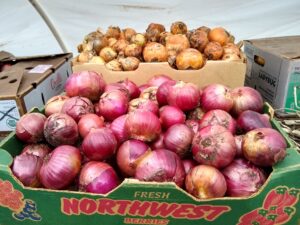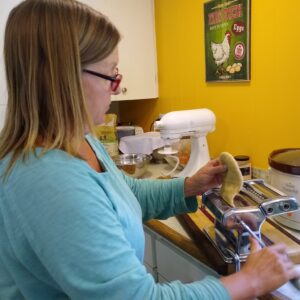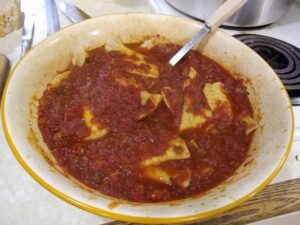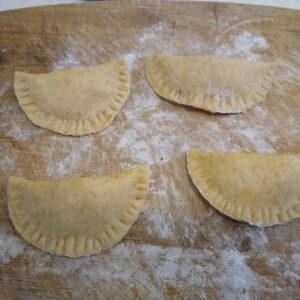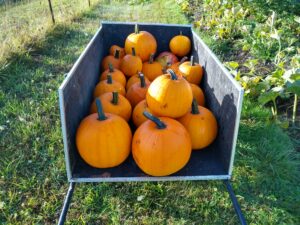My thirty-fifth farm was Oak Song outside of Eugene, Oregon.
The Farm
The farmers are June and her daughter Christina. They are originally from Southern California. Christina has always wanted to be a farmer. To prepare for that she studied resource management which had classes in farming, and she worked on farms for four years. Christina also spent time in the Peace Corps in Niger. June wanted to get out of Southern California. She came to Eugene and it felt right; the people were friendly and she liked the landscape. In 2016, she bought the property that would become Oak Song. Christina moved onto the property right away. With her solid farming background, she was able to start a farm on her own, while also raising a newborn. June moved to the farm a year ago. Oak Song was in its third year when I was there in September.
My Experience
For the first two years, Christina did all the farm work herself while raising a toddler. She planted the fields, milked the goats, and cared for the chickens. It seems amazing. Now she has her mother to help with some of the tasks, but there is still more to do in the fields than one person, and with another baby on the way, can manage.
I was their first WWOOFer. Christina had just posted Oak Song as a host farm on the WWOOF site and the first response she got was from me, an older woman of 59. When she expressed concern to her mother, June said, “She’s my age!” I was invited to the farm.
Soil Building
My first two days were spent clearing out the rows of colorful leaf lettuce, which is sold as a mixed salad. It had been harvested once but was now too old to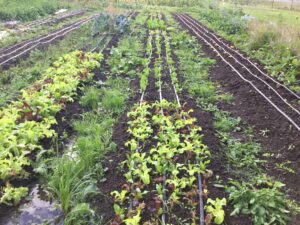 harvest again. Christina commented that she hadn’t mastered the art of the second cut. I picked a few leaves and thought they tasted fine, but I’m not a picky eater. Instead of pulling the plants up, roots and all, I used a special knife to cut them off at ground-level so the root balls stayed in the soil. The soil is clay and slippery when wet! Christina is in the process of building quality soil. Pulling the roots out takes good soil out of the ground. Leaving the roots in the ground allows them to decompose and add nutrients.
harvest again. Christina commented that she hadn’t mastered the art of the second cut. I picked a few leaves and thought they tasted fine, but I’m not a picky eater. Instead of pulling the plants up, roots and all, I used a special knife to cut them off at ground-level so the root balls stayed in the soil. The soil is clay and slippery when wet! Christina is in the process of building quality soil. Pulling the roots out takes good soil out of the ground. Leaving the roots in the ground allows them to decompose and add nutrients.
I like tiding up and getting rid of old things, so I was delighted to have more beds to clear out. They were thick with weeds since weeding is something Christina doesn’t have time for. In these rows, I pulled up the vegetable plants and weeds, then clipped off the roots to be tilled back into the soil.
Christina would come home from running errands in town and see the work I’d done clearing rows. She was delighted to have a second pair of hands helping out.
Divided Duties
Oak Song is a collaborative effort of mother and daughter. They have different, but complementary interests. Mother June prefers the kitchen where she 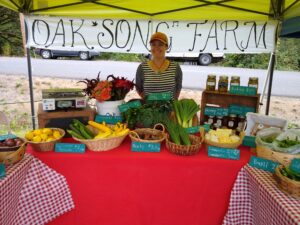 makes yogurt and cheese from the goats she milks. She also bakes, cooks, and cans. Daughter Christina likes to be outside, farming the vegetables and flowers. Selling at farmers markets is June’s idea. The farm stand is Christina’s. They try new ideas like setting up a stand at a local winery that has live music. Sales weren’t too hot, but I enjoyed the wine, pizza, and music.
makes yogurt and cheese from the goats she milks. She also bakes, cooks, and cans. Daughter Christina likes to be outside, farming the vegetables and flowers. Selling at farmers markets is June’s idea. The farm stand is Christina’s. They try new ideas like setting up a stand at a local winery that has live music. Sales weren’t too hot, but I enjoyed the wine, pizza, and music.
Vegetables for Single People
Christina told me to discard the large squashes. They seemed perfectly fine to me, but many of Christina’s customers are single. “What am I going to do with all of this?” they’d ask her, holding a large squash. She told me people get overwhelmed with large vegetables; plus, small vegetables, like squash, taste better. Christina grows mini cantaloupes and cuts the tops off leeks for the same reason: to keep the vegetables single-sized. Harvesting the squashes, I noticed the plants had male and female flowers right next to each other. I’d never noticed gender on a vegetable plant before.
They sell at two farmers markets: June does the Bailey Hill market next to a liquor store on Wednesdays, and Christina sells at the bigger Spencer Grange market on Saturdays. The attractive red and white farm stand sits by the road and is open daily. It has regular customers.
There’s Always One
One of the goats–cute, little, Louise—is an escape artist. She can flick up the bottom of a fence just enough to crawl right under it. I was pushing a wheelbarrow up the steep gravel road to the chicken and goat pens when Louise walked up alongside me. She should have been inside that pen! When I called her out on that, she flicked the fence up and went right back in. The main problem with this is she gets into the chicken pen and eats their grain. June is concerned about the cost of the grain; Christina is concerned of the possible health consequences to Louise. If she overeats, she could die. It’s a problem of being a ruminate. (cud chewer.)
June made sure I had a good time. She spruced up the Avion, the 30 foot trailer I stayed in, by filling the fridge and pantry with goodies. The radio was on playing a nice collection of jazzy folk music to keep the mice from coming in. We went to a couple of her favorite wineries. I prefer beer, but I greatly enjoy the beauty of the vineyards. June took me kayaking in a large reservoir; the highway across the water buzzing with almost silent cars. I also learned how to make raviolis. June used her sourdough starter to make the dough and her goat cheese for the filling. The shaping took practice and I found it was best for me to use a fork. Yum!
September Rains
Weather is a farmer’s friend or foe. I arrived to a harvest moon with beautiful sunshine. (Actually, I arrived enveloped in a gray cloud during a thunder and lightening downpour, but the following days were lovely.) I harvested cherry tomatoes and some strawberries. During the week, I noticed lots of strawberries plumping up and turning fire engine red. They would be perfect for harvesting on Monday after my two days off. On Sunday it rained. When I went out to harvest on Monday, the tomatoes were split open from too much moisture and the strawberries had rotted. Poo!
Oaks, Pines, Shrooms, Ocean, and Beer
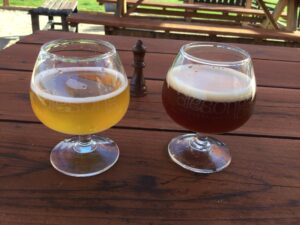 During my time off I drank beer and hiked. An interesting brewery called Alesong was nearby, overlooking the numerous vineyards. They specialize in
During my time off I drank beer and hiked. An interesting brewery called Alesong was nearby, overlooking the numerous vineyards. They specialize in 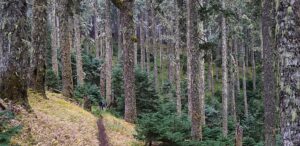 barrel-aged blended beers. The blending involves fruits and herbs. Central Oregon is oaks and pines, a nice change from the firs around Seattle. My favorite hike was Diamond Creek Falls-Salt Creek in the Cascade Range east of Eugene. Much of the forest is rhododendrons, as far as the eye can see. It must be magnificent in June when the rhodies are in bloom! I passed a group mushroom hunting, and then to my surprise, I found a King Bolete. I didn’t know exactly what it was, but I’d seen photos of it on a mushroom Facebook group. I took a photo of the giant shroom and left it where I found it. Finding my first edible mushroom sparked a renewed interest in joining the Puget Sound Mycological Society again in the hopes I might learn enough to collect my own mushrooms. (When I’d been a member in the past, the mushrooms hadn’t cooperated. I’d go out on a foray, but there wouldn’t be any mushrooms. That quickly killed my interest.) I drove out to the coast on a rainy day and listened to the rain drip off my raincoat. On a sunny day, I went out to Mary’s Peak, the highest peak in the Coastal Range with great views of the ocean. Climbing up the road, the sky turned to white. Standing at the top was like being in heaven, floating in white clouds. These ghostly clouds made the forest magical. The color of the tall lichen-covered trees reminded me of the tundra in Denali. A tall hedge of wide blue spruce trees looked impenetrable. It looked like no forest I’d seen before.
barrel-aged blended beers. The blending involves fruits and herbs. Central Oregon is oaks and pines, a nice change from the firs around Seattle. My favorite hike was Diamond Creek Falls-Salt Creek in the Cascade Range east of Eugene. Much of the forest is rhododendrons, as far as the eye can see. It must be magnificent in June when the rhodies are in bloom! I passed a group mushroom hunting, and then to my surprise, I found a King Bolete. I didn’t know exactly what it was, but I’d seen photos of it on a mushroom Facebook group. I took a photo of the giant shroom and left it where I found it. Finding my first edible mushroom sparked a renewed interest in joining the Puget Sound Mycological Society again in the hopes I might learn enough to collect my own mushrooms. (When I’d been a member in the past, the mushrooms hadn’t cooperated. I’d go out on a foray, but there wouldn’t be any mushrooms. That quickly killed my interest.) I drove out to the coast on a rainy day and listened to the rain drip off my raincoat. On a sunny day, I went out to Mary’s Peak, the highest peak in the Coastal Range with great views of the ocean. Climbing up the road, the sky turned to white. Standing at the top was like being in heaven, floating in white clouds. These ghostly clouds made the forest magical. The color of the tall lichen-covered trees reminded me of the tundra in Denali. A tall hedge of wide blue spruce trees looked impenetrable. It looked like no forest I’d seen before.
At the end of my stay I harvested pumpkins for the farm stand. It was my first time! I like their individual personalities. I turned over two compost piles and cleaned out the winter squash beds. Christina commented that the beds looked great and she wished she could plant something else, but it’s too late. I hope WWOOFers come next year so there will be enough hands to accomplish Christina and June’s dreams on this wonderful farm.

